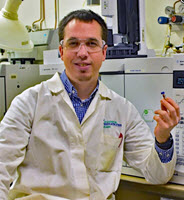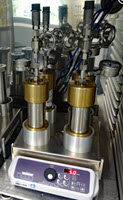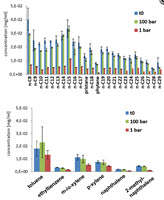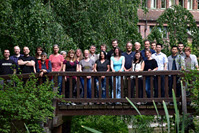
When the Deepwater Horizon incident occurred, not much was known about how conditions in the deep sea would affect oil biodegradation. Juan Viamonte uses high-pressure reactors that simulate conditions at depth to observe microbial degradation and help predict what might happen should another deep-ocean oil spill occur.
Juan is a Ph.D. student with the Hamburg University of Technology’s Institute of Technical Biocatalysis and a GoMRI Scholar with the Center for the Integrated Modeling and Analysis of Gulf Ecosystems II (C-IMAGE II).
His Path
Juan discovered his love for science when he was eighteen and searching for a career path. Unsure of what he wanted to study, he chose chemistry on a rather unorthodox basis – because a girl he liked was studying chemistry. “When I was in high school, many people already knew that they wanted to be, but I had no clue. I didn’t know that I wanted to be a scientist my whole life – I guess you could say science found me!” Juan laughed. He began a chemical engineering degree at the University of Zaragoza in his hometown in Spain. However, he believes he truly fell in love with his work while conducting undergraduate research at the University of Denmark. There, Juan discovered an exciting “new world” with many opportunities to share research and learn and grow as a scientist, inspiring him to pursue a master’s degree.

Juan completed his master’s in chemical and bioprocess engineering at the Technical University of Hamburg (TUHH). He was already working on his Ph.D. in chemistry there when his advisor Dr. Andreas Liese received GoMRI funding and offered him a graduate position researching biodegradation under high-pressure conditions. Juan accepted, thinking about how several past oil spills had significantly impacted the Spanish coastline’s flora and fauna. “One day we’ll have to turn to renewable energy, but right now humanity depends on crude oil,” said Juan. “I’m interested in what is going to happen in the crude oil industry once we reach a point where we can’t extract any more or have to do dangerous things like fracking to extract it. Many problems are arising from these more extreme methods, and I want to help understand all of this dynamic change.”
His Work
Oil-degrading microbes require oxygen to metabolize oil compounds. Juan and fellow C-IMAGE graduate students Steffen Hackbusch and Nuttapol Noirungsee combine microbes collected near the Deepwater Horizon site with oil and seawater inside high-pressure reactors that simulate conditions at 1,500 meters depth and 4° C. Juan observes the oxygen consumption of microbes and monitors their biodegradation process. When oxygen depletion, he assumes that the microbes have consumed all the oil that they can. Juan then uses gas chromatography mass spectrometry to analyze the reactor’s contents to determine the amount of oil that the microbes degraded.
Juan explained, “Imagine that you put in one drop of crude oil at the beginning of the process, and after one month the microorganisms have finished eating the oil. Well, the microbes don’t eat all of the oil – they only eat [certain compounds in it]. If you can determine how much of the oil has been consumed in that time period, you can predict what may happen to the crude oil in a realistic oil spill scenario.”

Juan is incorporating other variables, such as methane gas and Corexit dispersant, into his high-pressure experiments to learn how microbial oil degradation may change under different conditions. He also developed a high-pressure system that can be regulated to 4,000 m depth to test and compare possible differences in microbial degradation between 1,500 and 4,000 m. Juan’s experiments are ongoing, but he plans to develop prediction models based on his data that account for these biodegradation variables. “Before Deepwater Horizon, we didn’t know how quickly oil was going to degrade at high-pressure. Now, we have a hint,” said Juan. “With many other deep-water oil ventures planned for the future, I hope my research can help us estimate what percentage of oil would be degraded and to what extent if this or a similar accident happened again.”
His Learning
Juan listed teamwork, interdisciplinary collaboration, and knowledge sharing as the most important lessons he has learned through his GoMRI research. Being a member of a large consortium, he networked with scientists across many fields and learned the value of communication. “If we don’t share this knowledge, we aren’t going to grow as humans or as scientists,” said Juan. “The most important thing about science is you cannot hide a secret. We are discovering how nature works – communication is essential.” Dr. Liese commented that Juan reflects these values in the way he conducts his research, saying “Juan is a very open-minded person, who is always watching out to integrate [with our collaborative] partners.”

Juan also discussed how learning about the biological aspects of his work opened his eyes to a broader scope of his research. Trained in chemical engineering, Juan had a limited background in biology but was fascinated when he learned that certain microorganisms bloomed in the presence of oil because they were able to consume and degrade it. “I was used to taking Chemical A and Chemical B and a solvent and mixing them all together to get a result. I wasn’t really aware that those actions would cause organisms to do all of these really cool things. It was an exciting realization for me!”
His Future
Juan hopes to continue his research after graduation. Whether his scientific career is in industry or academia, he wants to continue pursuing what he calls the most exciting part of his career – crude oil research. He advises that students considering a scientific career follow a similar mindset. “Whatever it is that makes you happy, chase it. Don’t be convinced by society what an acceptable or more worthy career is. In the end, you’ll be happier and more successful doing something you love than doing something you think you ‘should’ be doing.”
The GoMRI community embraces bright and dedicated students like Juan Viamonte and their important contributions. The GoMRI Scholars Program recognizes graduate students whose work focuses on GoMRI-funded projects and builds community for the next generation of ocean science professionals. Visit the C-IMAGE website to learn more about their work.
By Stephanie Ellis and Maggie Dannreuther. Contact sellis@ngi.msstate.edu with questions or comments.
************
The Gulf of Mexico Research Initiative (GoMRI) is a 10-year independent research program established to study the effect, and the potential associated impact, of hydrocarbon releases on the environment and public health, as well as to develop improved spill mitigation, oil detection, characterization and remediation technologies. An independent and academic 20-member Research Board makes the funding and research direction decisions to ensure the intellectual quality, effectiveness and academic independence of the GoMRI research. All research data, findings and publications will be made publicly available. The program was established through a $500 million financial commitment from BP. For more information, visit https://gulfresearchinitiative.org/.
© Copyright 2010-2018 Gulf of Mexico Research Initiative (GoMRI) – All Rights Reserved. Redistribution is encouraged with acknowledgement to the Gulf of Mexico Research Initiative (GoMRI). Please credit images and/or videos as done in each article. Questions? Contact web-content editor Nilde “Maggie” Dannreuther, Northern Gulf Institute, Mississippi State University (maggied@ngi.msstate.edu).
